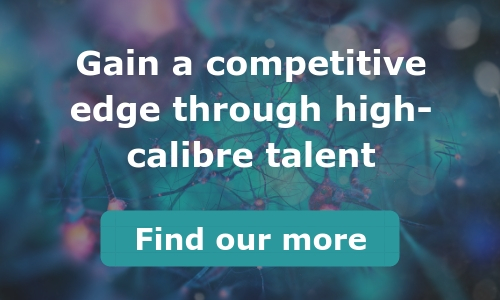In recent years, the business case for diversity in the workplace has been gaining traction. Life science organisations that incorporate it into their business strategy benefit across the board, from an increase in productivity to improvements in employee retention. With Forbes stating that there’s a direct correlation between levels of bias and feelings of inclusion in the workplace, it’s clear that more needs to be done to embrace diversity and reap the benefits.
Life science organisations have the power to bring about change. But despite their best efforts, hiring a diverse workforce that reflects the makeup of society remains a challenge. However, the vast amount of research on the financial and performance benefits that come with a diverse workplace makes this a no brainer.
What is workplace diversity?
Diversity forms the fabric of society. You should aim to have a diverse workforce consisting of individuals with inherent diversity traits (i.e those that you were born with, such as age, sex and race) and acquired diversity traits (i.e. those gained through experiences, such as previous employment and education). Organisations are learning that by supporting diversity, there are numerous benefits to be had.
A compelling moral case:
Before we delve into the business and performance benefits of workplace diversity, ensuring that there’s equality in the workplace is morally the right thing to do. Every employee deserves recognition for the work they undertake, no matter their identity or background. The average employee spends upwards of 90,000 hours (⅓ of their lives) at work, often putting in overtime to propel your organisation to success. For their dedication and enthusiasm, they deserve to enjoy their jobs, thrive in the workplace and be rewarded. It makes no difference what they look like or where they’ve worked previously, it’s the morally sound thing to do.
Additionally, as the hiring manager, you have a responsibility to ensure that every candidate has an equal chance of success during the hiring process, which means putting preventative measures in place to avoid unconscious biases. For more information on implementing diverse hiring strategies, read How To Attract Diverse Life Science Leaders With Your Employer Brand.
The business case for diversity:
Workplace diversity can drive business growth, helping you outperform your competitors. Without further ado, here are several points outlining the business case for diversity:
1. Increases productivity:
Many organisations are reluctant to hire diverse candidates because they fear that the introduction of different people would be counterproductive, causing culture clashes and hindering productivity. When you aim to bring diverse individuals together, inevitably adjustments will be required. For example, people of different nationalities may suffer from communication issues initially, particularly if there are language barriers in place. Naturally, this would incur that productivity is reduced.
However, despite the possibility of culture clashes and language barriers, immigration has actually made the UK workforce more productive according to recent research. A growth of immigrants in the UK labour force by 1 percentage point has caused an increase in overall productivity by 2-3 percentage points. This clearly demonstrates that despite cultural differences, teams can work together and thrive.
RELATED: Increase quality-of-hire by partnering with a reputable boutique talent consultancy
2. Better problem-solving abilities:
Research has demonstrated that diverse teams make better business decisions, outperforming individual decision-makers up to 87% of the time.
In an ideal world, you want your workforce to be comprised of people with unique perspectives. When you bring diverse individuals together, each with different experiences, backgrounds, personalities and ability to process information, they will intrinsically approach the same situations in different ways. There are multiple ways to solve a problem, rather than there being just one right answer. With a non-diverse team, each individual is likely to come to the same conclusion when faced with a challenge. In contrast, a diverse team will approach the same problem from different perspectives and spend more time evaluating all options in order to identify the best one.
3. Drives profitability:
Every organisation wants to identify ways in which they can engineer growth, and one of the less obvious but most effective ways is by hiring diverse candidates.
- Organisations with diverse teams have 19% higher revenue.
- Organisations in which women hold leadership positions are 21% more likely to experience above-average profitability.
- For ethnically diverse teams, they’re 35% more likely to experience above-average profitability.
These statistics make it abundantly clear that the more diverse your team, the greater the profit margins. While the reasoning for this growth in profit isn’t clear, the advantages that come along with diversity, namely increased productivity and better problem-solving abilities would naturally have an impact on financial growth.
4. Drives innovation:
Diverse organisations are 1.7 times more likely to be innovation leaders, devising more innovative ideas and ways of doing things. It makes perfect sense when you think about it; a greater perspective encourages innovative thinking. When employees are able to bounce ideas off of each other, they are able to learn from one another’s unique experiences, helping to get the creative juices flowing. Organisations that don’t bring fresh ideas to the table are stuck with dry, stagnant ideas. You want your customers to anticipate your next move and the only way to keep them interested is to foster innovative ideas.
5. Enhances the reputation:
An organisation that prioritises and promotes diversity has a significantly positive effect on its reputation. Organisations with diverse employees are generally perceived to be good employers. When you’re classed as a good employer, your customers are more willing to do business with you and you are more likely to attract top talent. And with 67% of job seekers factoring in an organisation’s stance on diversity when considering job offers, it’s critical you get the balance right. If you want to attract and recruit the best talent to propel your organisation to success, then you need to ensure that you’ve sparked desire and interest in their minds so that they want to work for you, not just need to.
6. Unearth a larger talent pool:
Diverse candidates belonging from minority communities are often at a disadvantage during a job search. Sometimes, during the hiring process, unconscious biases and prejudices can eliminate qualified candidates due to their diversity. However, organisations with diversity at their core attract top talent to fill important positions. Hiring managers are no strangers to pursuing candidates, but with strong workplace diversity, candidates will be lining up to work at your organisation. This opens up opportunities to discover top talent that would have otherwise gone unmissed. This is particularly true for small to medium-sized enterprises (SMEs) and startup life science organisations whose geographical scope is quite limited.
7. More representative of customers:
If your workforce doesn’t represent the makeup of society, let alone your customers, your organisation will struggle to deliver. On the other hand, the more diverse your employees, the more likely they are to be able to think just like your ideal consumer, identifying any problems or changes that need to be adapted. Organisations with employees that can relate to and understand consumer motives will help to drive more profit and engagement.
8. Boosts employee morale and engagement:
Employees that feel respected and appreciated generally feel happier in the workplace. They are proud to work for an organisation that embraces their true identity, encouraging them to engage and speak highly of you as an employer. A positive work atmosphere inspires high spirits and produces high-quality work. Employees that positively engage with their organisation are more likely to shout this from the rooftops, enhancing your reputation as an employer and attracting high-calibre candidates.
9. Improves employee retention:
When employees no longer feel valued or respected in the workplace, they’ll eventually resign; no employee likes to deal with a toxic work environment. Hiring managers are forced to deal with the consequences of their actions. The hiring process can be a slow, arduous task in order to find the correct replacement. It would make far more sense to prevent these problems from even occurring in the first place, which can be done by creating an inclusive, diverse workplace so that every employee feels appreciated for the work that they do. Organisations that make it their mission to promote diversity and equal opportunity will produce loyal employees who are far less likely to leave their role and force hiring managers to deal with this upheaval.
It’s important to understand that every organisation’s diversity strategy and how they are implemented will be different. This is because diversity inevitably means different things to different people. While implementing strategies to diversify your workforce might be a long process, the benefits far outweigh the risks of not modernising your organisation in this way and missing out on all of the above.
For more hiring advice tailored to hiring managers in the life science industry…
- Read The Importance of Workplace Diversity in the Life Sciences.
- Read How To Project Your Employer Brand To Attract Top Talent.
- View our talent solutions to see how we can help you gain a competitive edge through talent.
* Fraser Dove International is a talent consultancy operating exclusively across the life sciences industry. While our roots lie in executive search, we provide more than the traditional recruitment services. Uniquely placed within the market, we have been providing cutting-edge talent solutions and insight to organisations at all stages of their journey – from start-up to established leaders – since 2013.

 Estimated read time: 6 mins
Estimated read time: 6 mins Date posted:02/12/2019
Date posted:02/12/2019





